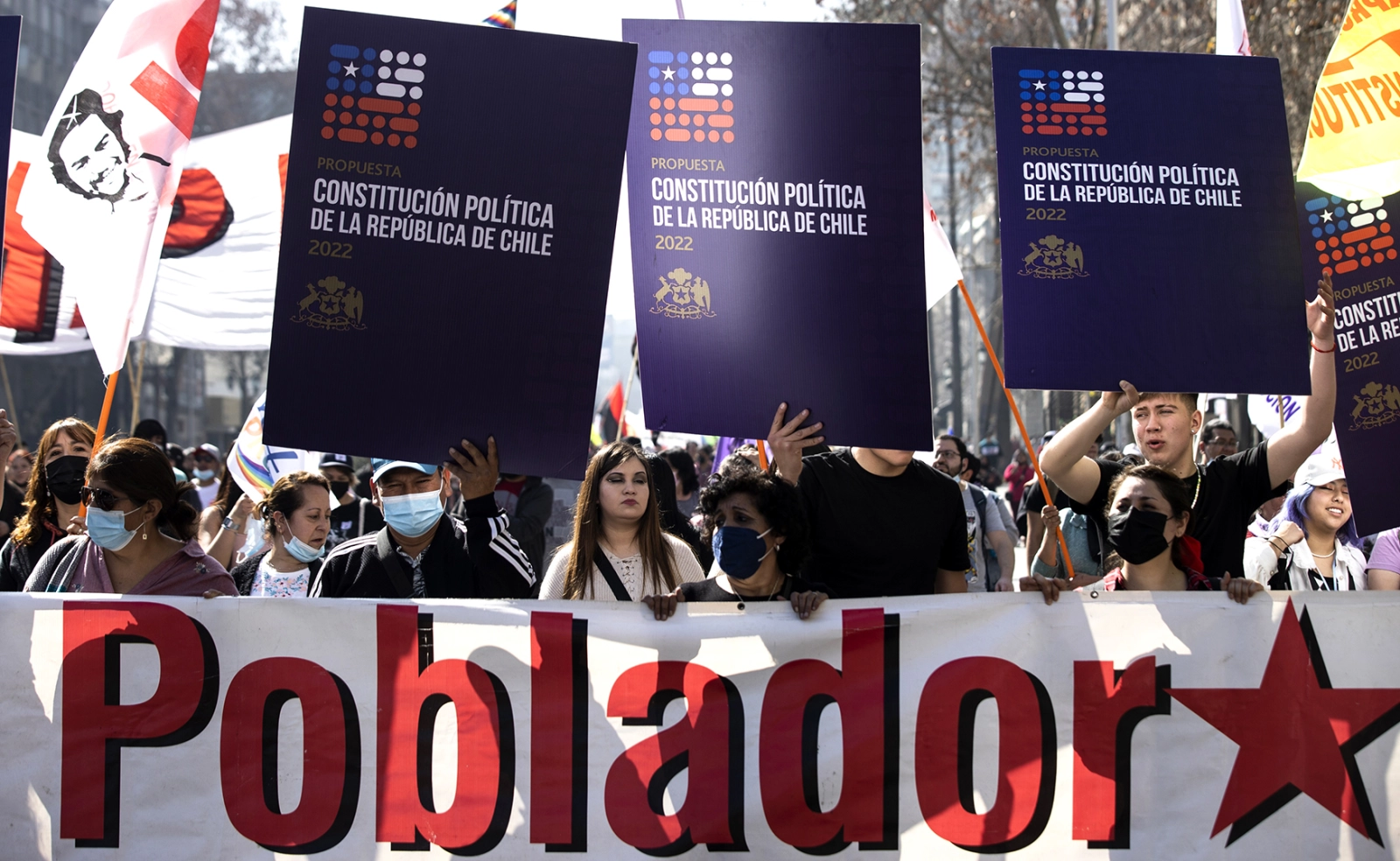
Supporters of Chile's proposed new constitution hold up placards in a street mobilization. Photo: EFE.

Orinoco Tribune – News and opinion pieces about Venezuela and beyond
From Venezuela and made by Venezuelan Chavistas

Supporters of Chile's proposed new constitution hold up placards in a street mobilization. Photo: EFE.
Some of the main advances are declaration of an ecological and plurinational state; recognition of indigenous peoples; human right to water and education; democracy based on gender parity.
More than 15 million Chileans are summoned to participate in a refendum this Sunday, September 4, in order to decide whether they want to approve the new constitution drafted by the Constitutional Convention or maintain the current one which dates from the dictatorship of Augusto Pinochet (1973-1990).
According to Chilean electoral law, in order to be approved the new Constitution must get at least 50% plus one of the total votes polled. If it does not reach the required number of votes, the current consitution that has been in force since 1980 will be maintained, which has been modified 50 times in the last 40 years.
The proposed new constitution, drafted for a year by the members of the Constitutional Convention and which emerged as a response to the social outburst of 2019, proposes numerous changes with respect to the current one and includes hitherto unpublished or unacknowledged rights of citizens.
🚨 En la cédula electoral encontrarás 2 opciones.
📌 Marca tu opción con ✏️ pasta azul, haciendo una línea vertical sobre la horizontal.
📌 Dobla tu voto y ciérralo. Muestra, corta y entrega a los vocales de mesa el talón numerado.
📌 Introduce el voto en la urna 📥 ¡Y LISTO! pic.twitter.com/Kqu3vVY9F3
— Servicio Electoral (@ServelChile) August 31, 2022
RELATED CONTENT: Why Lithium Power Politics Are Playing Out Very Differently in Chile and Bolivia
Main changes in Chile’s proposed new constitution
A plurinational and ecological state
“Chile is a social and democratic state of law. It is plurinational, intercultural and ecological. It is constituted as a supportive Republic, its democracy is based on equality and recognizes dignity, freedom, substantive equality of human beings and their indissoluble relationship with nature as intrinsic and inalienable values.”
Thus begins the first article of the proposed new constitution of Chile, establishing a line of profound and major changes.
Recognition of indigenous peoples
The text of the constitution recognizes autonomy and rights, proposes guarantees in territorial terms with the recognition of spaces, lands, cultures, education, health, beliefs and languages of all indigenous peoples.
Nature and the human right to water
The constitution establishes that water is an essential resource for life and the exercise of human rights and the rights of nature. Therefore, it is the duty of the State to protect water in all its states and phases, in addition to the hydrological cycle.
The National Water Agency will have an autonomous character, with legal personhood and its own assets. It will be in charge of ensuring the sustainable use of water for present and future generations, access to the human right to water and sanitation, and the conservation and preservation of associated ecosystems.
It is to protect biodiversity, preserving, conserving and restoring the habitat of native wild species and their proper distribution to sustain the viability of their populations and ensure the conditions for their survival and non-extinction.
Parity, diversity, equality, non-discrimination, and a life free of violence
The constitution protects and enforces human rights. It supports the condition of equality in participation in society and politics independent of sex, gender or sexual orientation.
It ensures equality before law and the principle of non-discrimination. It ensures the eradication of violence in the judicial system. It consecrates a life free of violence against children, women and those belonging to sexual diversities.
It goes from a “democratic republic” to a “parity-based democracy,” which implies that women must occupy at least 50% of all State bodies, for which the constitution proposes measures to achieve substantive equality and parity.
María Elisa Quinteros, who was president of the Constitutional Convention, commented that this is “the first gender parity-based constitution in the world.”
Right to education
The constitution recognizes the right of all individuals to education and considers it a primary and unavoidable duty of the State to guarantee access to quality public education.
🛑 URGENTE – Hablando de derechos de NNA, vea Usted cómo detienen a este niño que participa en la marcha de las y los secundarios por mejoras en las condiciones de estudio en distintos establecimientos de Santiago en Chile @teleSURtv pic.twitter.com/7yViswNpof
— Pao Dragnic (@PaolaDragnic) August 29, 2022
It guarantees the freedom of education, including the freedom of fathers, mothers and guardians to choose the type of education for the people in their care, respecting the best interests and progressive autonomy of children and adolescents to quality education.
Three educational functions are recognized: research, teaching, and collaboration with society. It places public education at the center. It proposes establishing a state university for each region of the country, reinforcing decentralized development and considering community, regional and national needs.
(Telesur)
Translation: Orinoco Tribune
OT/EF/SC